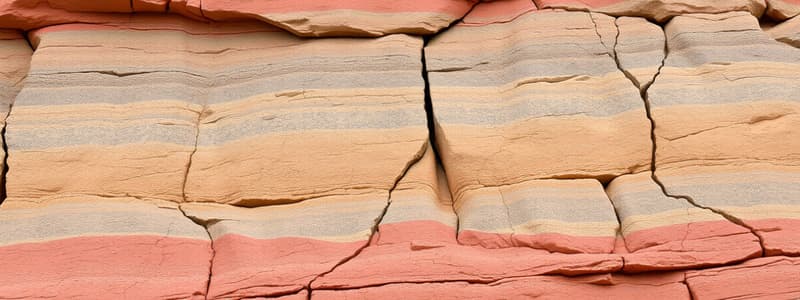Podcast
Questions and Answers
What is sedimentary rock?
What is sedimentary rock?
A type of rock that forms when particles from other rocks or the remains of plants and animals are pressed and cemented together.
What is weathering?
What is weathering?
The breaking down of rocks and other materials on the Earth's surface.
What is erosion?
What is erosion?
Processes by which rock, sand, and soil are broken down and carried away.
What is compaction?
What is compaction?
What is cementation?
What is cementation?
What is decomposition?
What is decomposition?
What is wind?
What is wind?
What is water?
What is water?
What is ice?
What is ice?
What is pressure?
What is pressure?
What is a fossil?
What is a fossil?
Flashcards are hidden until you start studying
Study Notes
Sedimentary Rocks
- Formed from the pressing and cementing of particles from other rocks or organic remains.
- Key processes involved in their formation include compaction and cementation.
Weathering
- Involves the breaking down of rocks and materials on Earth's surface.
- Factors contributing to weathering include various climate conditions and chemical reactions.
Erosion
- Describes processes that break down and transport materials like rock, sand, and soil.
- Caused by agents such as wind, water, ice, and glaciation.
Compaction
- A process that reduces the volume of sediments, squeezing them together to create sedimentary rocks.
Cementation
- Occurs when dissolved minerals crystallize and bind sediments into a solid mass.
- Plays a crucial role in the formation of sedimentary rocks alongside compaction.
Decomposition
- Refers to chemical reactions that break down complex compounds into simpler products.
- Essential in nutrient cycling and organic matter breakdown.
Wind
- Defined as air movement that occurs from high-pressure areas to low-pressure areas.
- Can contribute to erosion and shape landscapes through sediment transport.
Water
- Vital for all life forms; consumed by plants, animals, and humans.
- Participates in processes like photosynthesis, with the ability to shape geological features.
Ice
- Represents periods of severe cold, during which large areas were covered with ice sheets.
- Influences erosion and landscape changes through glacial movement.
Pressure
- Describes atmospheric concepts where cool air descends creating high pressure, while warm air rises leading to low pressure.
- Affects weather patterns and can influence erosion processes.
Fossils
- Imprints or remains of organisms that existed in the past.
- Provide significant information about historical life forms and environmental conditions.
Studying That Suits You
Use AI to generate personalized quizzes and flashcards to suit your learning preferences.




